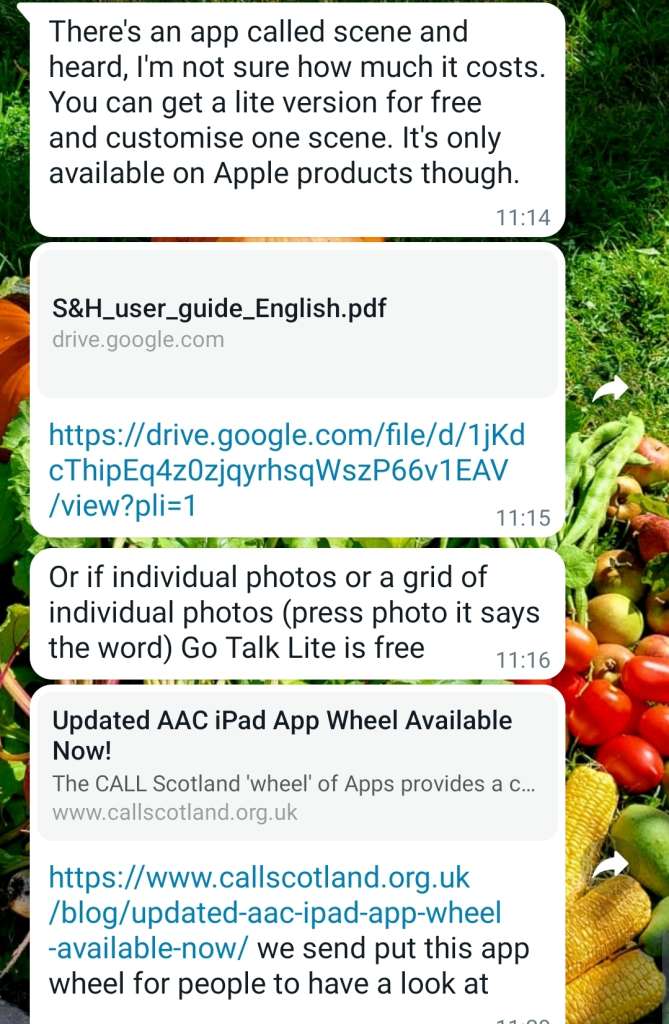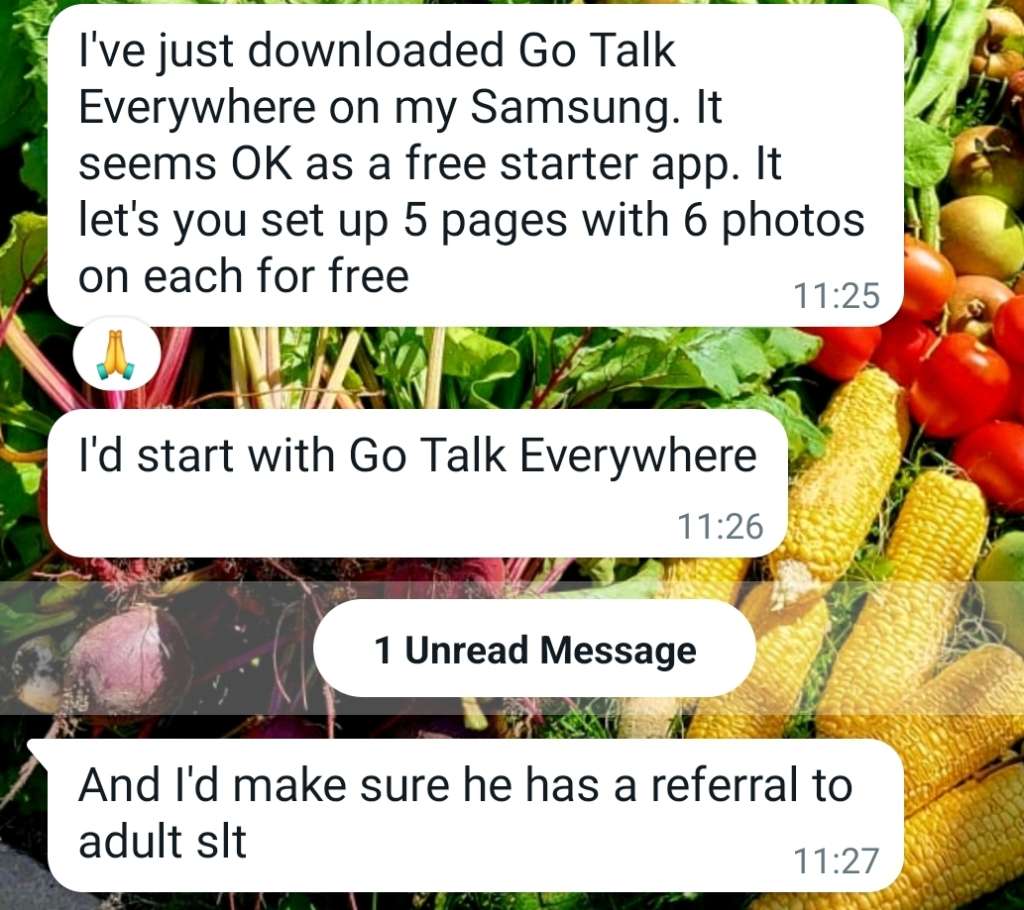My 88 year old neighbour had a stroke 18 months ago and I’m trying to find something to help him with his speech. He’s currently having a break in a care home so I only get to see him once a week but when I do go he likes to get his picture chart out and try to identify the items and say the word.
Is there something out there like a Childs toy that has a touch screen that would show you a picture then when you touch it it would say the name of the item? Thanks.
Download a 'my first words' type of app for a phone or tablet?
Proloquo2Go app or similar on a tablet?
Or Google AAC devices to buy or hire.
My son has CP which affects his speech and has had various VOCAs over the years. They have been set up by communication specialists as it works via grouping words that tend to be used in common and has an element of predictive text. There’s also groups by topics as it can be frustrating for the user to have to scroll through pages to make a sentence.
Ask your local NHS speech and language therapy service first as they may be able to assess and provide or at least make recommendations. Or they may refer on to the regional specialised AAC (augmentative and alternative communication) service covering your area.
https://www.communicationmatters.org.uk/what-is-aac/assessment-routes/specialised-services/
A guy I work with has speech issues after a stoke - once a week he pops out for an hour and sits in his car and has one-on-one NHS speech therapy sessions via his iPad.
I think expert guidance is the key - its not like childhood learning - its not learning words - as in building a vocabulary - its getting your thoughts out as words and thats something different. And someone knowledgable needs to be feeding back on the effort and success.
In his experience (and therefore mine) F-bombs seem to come out quite easily when the motivation is there 🙂
Any professional AAC device will likely be well thought out, efficient, and expensive.
any tech bro tablet based thing is likely to be poorly designed, frustrating, and ultimately next to useless.
but maybe I’m generalising too much?
the Stroke Association have an aphasia guide. https://www.stroke.org.uk/what-is-aphasia/communication-tools
what rehabilitation did your neighbour get after being discharged from hospital? That should have included speech therapy.
My mum had a stroke about a year ago, she's just about gotten a handful of words back she can do "yes" and "No" and manage the odd name, she's managed to sing happy birthday a couple of times, but everything else is "M,m,m,m,mmm,m!", it's a complete sentence but the signals aren't getting through as words about 98% of the time. Which is doubly frustrating for her as pre-stroke she would talk your arse off, and writing/drawing is out as she's also got partial paralysis on her right side too.
To get to the point she's currently at has been a lot of work for my Dad over the last ten months (pretty much every day) coaching her with words and doing flashcards and exercises with input from speech therapists... It requires time and patience and professional input.
My wife's PhD was in exactly this. From what I remember, even associating pictures and words is not always possible depending on the severity of the stroke. It may never come back. I'll double check with her when she wakes up.
My wife is also an SLT specialising in post stroke. She suggests having a look at the following:
depending on the severity of the stroke. It may never come back. I’ll double check with her when she wakes up.
It was a biggy, we've had any expectations for recovery appropriately managed and there may be some underlying dementia too (hard for doctors to assess with her limitations on communicating), between speech therapy and physio work every day she's generally just knackered whenever I see her. My Dad is a total grafter, I'm not sure this is how they planned to spend their 70s.
Anyway sorry to hijack your thread OP, but yeah see if you can discuss it with his speech therapist, we've found short sessions better as while some of it might seem quite basic (using cards intended for toddlers) it can be very tiring for the patient.
It's also worth learning to read their other queues (facial expressions and body language) and asking yes/no type confirmatory questions that can be answered with a nod/shake of the head, it's as much about helping morale by making them feel like they're still able to be understood and are being considered as it is about getting some capacity back. Good on you for helping.
Thanks for all the replies people, lots to go at there and I will check them out. To be fair his speech can be really good at times when he isn’t stressed ( that’s another story ) and you can have a semi decent conversation with him.
He struggles with names, places and dates and words with a few syllables. He was looking at a picture of a horse yesterday and he said to me that he couldn’t say Horse and didn’t realise he’d just said it perfect.
He knows what things are but just can’t get the words out and actually says that to me all the time.
Here's Mrs P's reply, with the actual links here:
https://drive.google.com/file/d/1jKdcThipEq4z0zjqyrhsqWszP66v1EAV/view?pli=1
https://www.callscotland.org.uk/blog/updated-aac-ipad-app-wheel-available-now/


@pisco thank your wife very much for that I shall have a good look later. I will have a word with the care home staff and see when the speech therapist is coming again and see if they can mention it and see if there is anything they can do for him.
